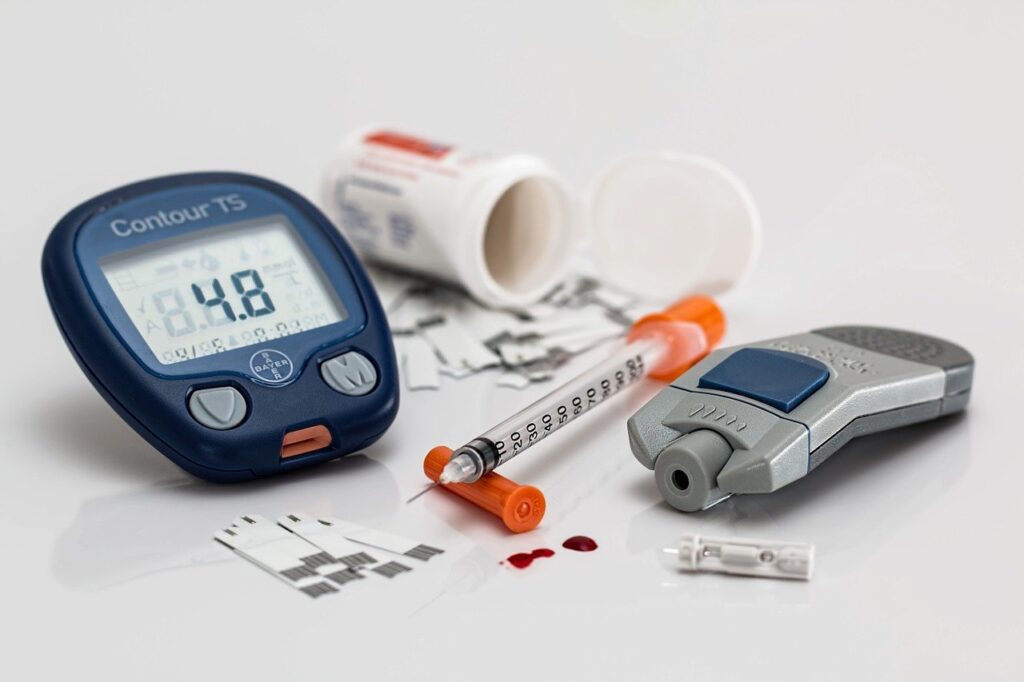This refers to diseases that occur as a result of excessive sugar in the body. When your body can no longer utilize glucose for energy, this can result in very serious complications.
What causes Diabetes?
For your body to utilize or unlock glucose, insulin is needed. When there is the absence of this insulin your blood sugar tends to soar leading to Type 1 Diabetes. On the other hand Type 2 Diabetes results when the insulin produced by the body is not enough or not effective in breaking down the glucose in the body.
Type 1 Diabetes: Most often this is diagnosed early in childhood, for some reason yet to be identified, the body’s immune system attacks the cells in the pancreas that produces insulin as a result the person is unable to produce insulin.
Type 2 Diabetes: On the other hand, this type is diagnosed at an advanced age and happens when the body does not make enough insulin or does not respond to the insulin as it should.
Now, what is with this insulin?
For the body to use glucose to generate the needed energy, insulin is required to ‘unlock’ or allow the glucose to enter the cell wall. So when there is non or not enough insulin the glucose builds up in the bloodstream leading to high sugar levels ( Diabetes Mellitus)
Who can have Diabetes?
Anybody can have diabetes, children, or adult alike. But, Type 1 Diabetes is diagnosed in childhood. In type 1 diabetes, the body does not produce insulin.
So who is at risk of type 1 diabetes?
- People with a family history of type 1 diabetes.
- Children because it is often diagnosed early in life.
Type 2 Diabetes is common among people aged 65 and above nonetheless it has to be diagnosed among children and younger adults especially those with much body weight or obesity.
Who is at risk of type 2 diabetes?
- People who do not move around often or are mostly inactive
- People with a family history of type 2 diabetes
- People with high body mass.
- People who do not eat a balanced diet.
- People who take too many sugary foods.
- Children and Adults.
What are the Complications from Diabetes?
Diabetes has long-term complications which oftentimes develop gradually and could be life-threatening. Some possible complications of Diabetes are listed below:
- Kidney Damage: Diabetes can cause severe damage to vital organs like the kidney which can lead to kidney failure or irreversible end-stage kidney disease.
- Skin Problems: Diabetes could cause bacterial and fungal infections on the skin.
- Eye Damage: Diabetes increases the risk of severe vision problems like cataracts and glaucoma and also the blood vessels of the retina can be damaged leading to blindness.
- Cardiovascular Disease: Diabetes increases the risk of heart disease or stroke.
- Foot Disease: Damage to the nerve in the feet increases the risk of some foot complications. Injuries, blisters or cuts often develop infections that are slow to heal.
- Hearing impairment: Diabetes increases the risk of serious hearing problems.
- Nerve Damage: Diabetes can cause numbness, tingling, burning or pain that often begins at the tips of the toes or fingers and slowly spreads upwards.
- Depression: People with type 1 and 2 Diabetes are at risk of depression.
- Dementia
- Erectile dysfunction
- Dental problems
What are the Symptoms of Diabetes?
In some people with type 2 diabetes, the symptoms may not be experienced but in type 1 Diabetes the symptoms come quickly and are more severe.
Here are some of the signs and symptoms of type 1 and 2 Diabetes:
- Slow to heal sores.
- Frequent Urination.
- Weight loss.
- Increased hunger level.
- Fatigue.
- Frequent skin, gum and vaginal infections.
- Blurry Vision.
- Ketones are present in the urine.
- Being thirsty most of the time.
- Numbness or tingling in the hands or feet.
- Dry mouth.
How is Diabetes diagnosed?
Diagnosis and management of Diabetes are done by checking glucose levels in a blood test. There are three tests that can measure the blood glucose levels in the body and they are:
- Fasting Glucose Test: This test is done in the morning after an eight hour fast overnight.
- Random Glucose Test. This test can be done any time of the day without the need to fast.
- Oral Glucose Tolerance Test. In this test, the blood glucose level is measured after an overnight fast then checked again after a sugary product is taken. The blood glucose level is checked at 1, 2 and 3 hours.
What is the treatment for Diabetes?
If you are diagnosed with Diabetes, it is important to do the following;
- Keep your blood glucose levels as normal as possible
- Lifestyle changes like exercise and proper dieting would greatly help manage your sugar level.
- Make sure your blood pressure is not over 140/90mmHg.
- Your diet should be more veggies, whole grain, fibre rich foods as well as fruits.
- Frequently check and maintain a normal blood cholesterol level.
If you are diagnosed with type 1 diabetes, you should take a regular shot of injectable insulin. Ask your doctor about the dose you require.
How to prevent Diabetes
Type 1 diabetes can not be prevented but only managed with regular shots of insulin into the body’s soft tissues.
Type 2 diabetes can be prevented and even reversed by;
- Regular exercise.
- Good eating habits.
- A generally healthy lifestyle.

